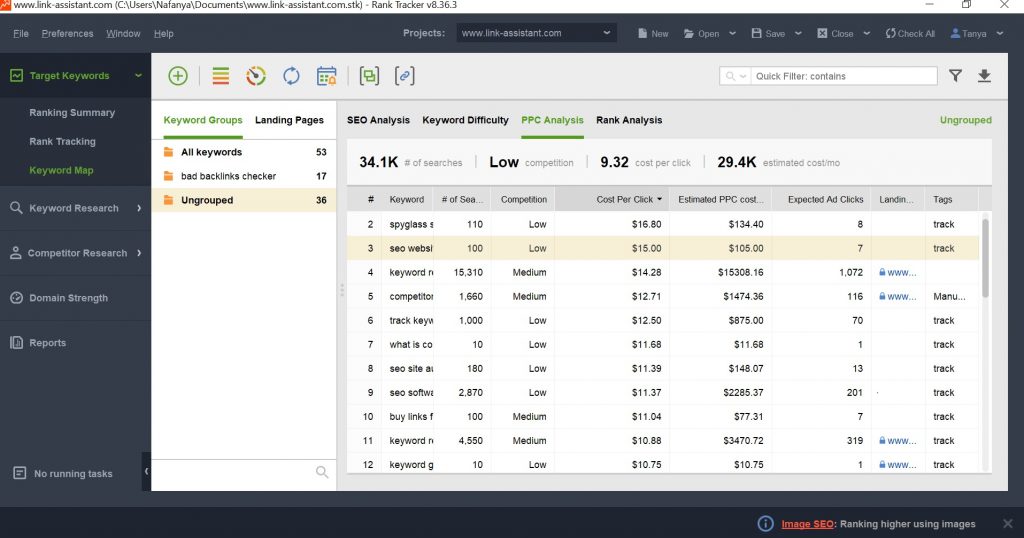Typically, blogs and forums dedicated to SEO and PPC discuss what’s better. While these two marketing methods are really different, it doesn’t mean you can’t implement them both. And even if you’ve chosen only organic or only paid search to target, you surely need to investigate the other side. Both SEO and PPC share a few common features, and mastering them will help you make the right decision in due time. So, let’s touch upon a few SEO techniques and tools that help make this choice well-meditated.
1. Keyword research
Keyword research is the cornerstone for the effectiveness of your campaigns in PPC and SEO alike. Typically, an advertising platform provides a keyword research toolbox of its own, as it is the case with Google Ads Keyword Planner. If you’re using this tool for keyword suggestions and traffic predictions, you should keep in mind the keyword matching type and when to use it.
For Google Ads, there are four types of keyword matching: broad match, modified broad match, phrase match and exact match.
- Broad match includes all the queries containing your keyword or parts of the keyword phrase and their variations in any position.
- Modified broad match type will trigger your ads if the specified keywords are present in the search query in the exact or close variant form. You simply add the + symbol before the most wanted word in your keyword phrase (without a blank space before the keyword). Modified broad match is something between a phrase match and broad match. The modified keyword will match the search queries with exact or close variants of this word in them (single and plural forms, acronyms, derivatives, and close synonyms). The remaining part of the phrase will work on broad match.
- Phrase match covers the search strings which may contain additional words but where your target phrase appears as it is.
- Exact match sets to match queries with your target phrase as it is, without variants or additional words.
Which type of keyword matching to use
15% of daily Google search queries are new. Certainly, you can hardly predict them all, however large your keyword list is. The only way to target these unique queries is by using the broad match (or modified broad match as a variant).
On the one hand, broad matching will bring tons of impressions and clicks. On the other hand, you should not expect that the conversion rate will be really high. The problem is that broad match often drives a lot of irrelevant traffic. Do you want to pay for clicks that will never convert?
So if you want to profit from the broad match, you need to monitor carefully your search query reports and exclude all irrelevant keywords by adding them to your negative keyword list.
Try to predict unwanted queries ahead: explore your Google Analytics data to detect keywords that bring useless traffic which increases the bounce rate on your site. Go to Acquisition > All Traffic > Channels, and review the keywords under the Organic Search and Google Ads tabs. Filter the keywords by Behaviour > Bounce Rate, pay attention to other stats as well, and spot which terms deserve to be added to the negative keyword list.
To test the type of match and see if it works for you, clone one of your ad groups and adjust to use broad, exact or phrase match and set the keywords in it on modified broad match. Run both groups for some time, and then compare the search query reports to see what match type performs better.
2. Keyword mapping
Experienced PPC marketers know that the success of their campaigns relies on keyword management. Break down keywords into relevant groups and map them to landing pages. This way you will have all your stats structured and analyzed, and your top pages gaining weight and effectiveness fast. Tight keyword grouping, creating groups and subgroups, ensures that your ad is relevant to the user intent which results in higher CTRs and more conversions.
This approach works exactly the same way in SEO. Your one top-ranking page most likely will include several search strings close in their theme and intent. You will map a group of keywords, with several long-tail keywords among them, for which you will map one landing page to optimize.
3. Search volume
When you explore the search volumes to decide whether to optimize for a certain keyword, bear in mind that you will not get as many search traffic as it promises. You will rank only for some exact keyword phrases that are the most relevant to your site. And a couple of more diverse queries containing this keyword with lesser traffic.
And even on exact matching, the search volume data you will get in your Google Ads might be inaccurate. You can invest a lot of resources into optimizing for a traffic-heavy keyword only to find that the search volume it gains is not even close to the one you’ve got in your keyword tool. So the best way is to consider launching a small PPC campaign to test your performance and see how many impressions your keyword gets before you start optimizing for it.
Search volume and competition is the core factor to decide whether you can use this or that keyword to rank up in SERPs as soon as possible. There is the keyword difficulty score which you use to estimate your SEO optimization expenses.
3. CTR Optimization
No need to tell, the higher you rank, the more traffic you will get. High CTR is something that helps search engines to guess that the page is valuable to users, so with time, ranking position and CTR correlate. You need to try hard not only to show up on the top search engine result pages, but also to entice users to click on your pages, and further, to stay, engage, and perform conversions. This rule works for both SEO and PPC campaigns. Google rewards advertisers with high CTRs with cheaper clicks and higher placements. That is why PPC marketers take ad testing seriously. They constantly test new titles, ad texts and banners to offer the best-performing ad design. You can try similar testing with your organic pages, by optimizing titles, tags, and meta descriptions.
PPC vs SEO research in Rank Tracker
Rank Tracker has a special PPC Analysis tab covering PPC and SEO metrics. This measurement allows a smart combination of PPC and SEO campaigns to get the most of your keywords and traffic.
The data are extracted directly from Google Ad Keyword Planner, although you can change the source setting from Preferences. The core values are:
- Cost Per Click: estimated approximate cost-per-click (CPC) you might pay for an ad for a certain keyword.
- Estimated PPC cost/mo: estimated cost of your PPC campaign for that keyword per month.
Setting these major PPC metrics next to your current SEO stats, you’ve got all you need to choose which keywords to target with SEO or PPC!
How-to with the Rank Tracker.
This is the middle stage of your keyword research module. It means you are likely to have several keyword phrases mined through a bunch of keyword methods. Also, you’ve got to configure settings from Preferences to access the Google Analytics stats (or any other source).
In the existing project with researched keywords, find the Target Keywords > Keyword Map module, and check out SEO Analysis and PPC Analysis tabs:
- Check the search volume: see which keywords can bring you substantial traffic.
- Check the Keyword Effectiveness Index (KEI): see if it is cost-efficient to run SEO activities to go for this traffic. The ratio between the Competition and Search Volume makes it clear whether the keyword is worth the effort (pick those marked with a green color). Additionally, you can see the Expected Visits estimates.
- Check the estimated PPC cost per month: see the costs required to drive that traffic with paid search.
Now you should be able to make an informed decision about whether to run an SEO or a PPC campaign for your keyword.
Profit with PPC ads where SEO fails!
For those keywords where your organic rankings fail, adjust a PPC campaign to beat your competitors. Check the estimated costs for your PPC advertising. Your goal is to gain over your competitors’ SEO traffic with the help of PPC ads in the niche where they outrank you organically.
Another way is to see which of your site’s high SEO rankings can be supported by PPC ads for more traffic and exposure.
Test keyword conversion with PPC, before starting SEO
Before planning a long-term SEO campaign for new keywords, find out if they are worth targeting – test their real conversion with a quick PPC campaign.
Wish to take advantage of these business-boosting SEO+PPC opportunities? Just download a fresh version of Rank Tracker SEO optimization software from the website. And make sure to get a registered copy of Rank Tracker to be able to use PPC analysis full force (saving your projects and tracking changes over time).
|
Recommended posts
|



